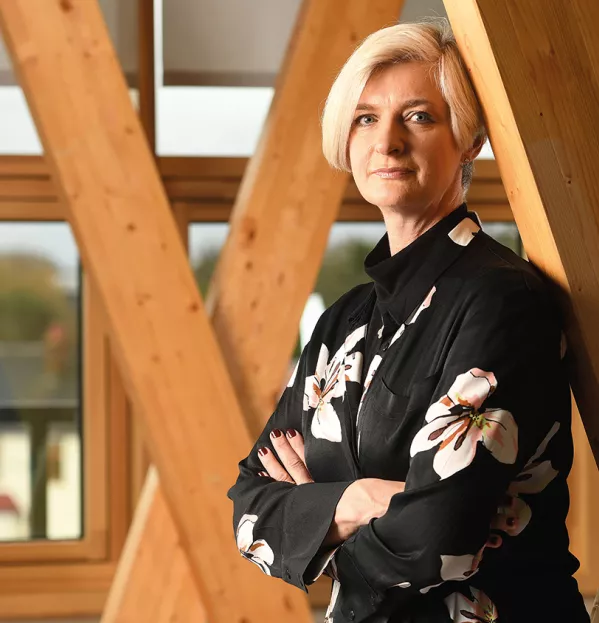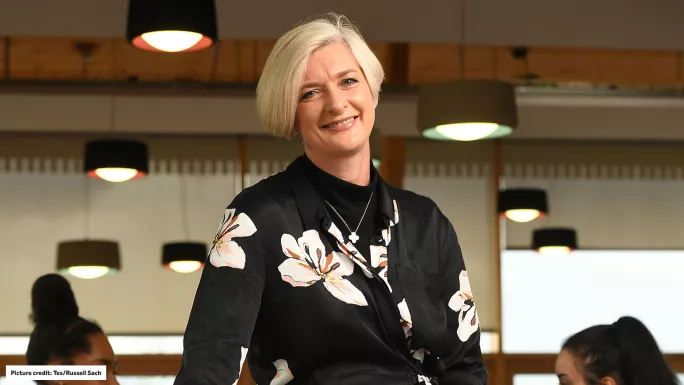‘Teaching girls to ask for that pay rise is really important’

Cheryl Giovannoni is sitting at a long table containing a neatly-stacked pile of books, at the top of which is a biography of Emmeline Pankhurst, leader of the British suffragette movement.
This is, it turns out, a fitting backdrop for our interview with the CEO of the Girls’ Day School Trust (GDST), a prominent chain of girls’ schools. Giovannoni’s conversation never strays far from the topics of gender equality and girls’ education.
In fact, her decision last year to quit a high-profile job running advertising agency Ogilvy & Mather was prompted by a desire to make a “bigger difference” in helping girls to progress - at a time when women are under-represented in senior positions across most industries.
For the majority of Giovannoni’s 30-year career in advertising and branding, she has mentored young women in business. Now, her mission is to equip pupils with the skills and confidence to fulfil their potential.
Speaking to Tes at Streatham & Clapham High School in South London, she says: “It is about teaching them those skills and having a sense of what it takes to be a leader. And the kind of resilience and grit required that helps.”
The trust’s alumni network of 75,000 women is a big part of her plan: the aim is to link every single sixth-former with somebody from an area of business or a profession that they may be interested in, in order to access mentoring and work experience.
GDST also holds a young leaders’ conference, at which pupils and staff hone their leadership and team building skills.
Giovannoni says: “I think teaching girls that being able to ask for that pay rise, or to demonstrate what you have achieved and to be confident in having those conversations, is really important.
“Girls do really well all the way through school, [but] when women tend to founder is when they get into the workplace. They don’t make as much progress as men do.”
And she thinks teachers provide the ideal role models for young women. “It is that inspirational teacher who often gives you a sense of possibility that can buoy you up and sustain you,” she says.
Given her stated commitment to female empowerment, did she ever feel conflicted while working in advertising - an industry notorious for peddling gender stereotypes? And, in particular, for an agency that represented Barbie? “I would be lying if I said not,” she admits. “Part of the frustration, and why I eventually decided I wanted to do something different, is that I don’t think the industry has made enough progress.”
But she is quick to point out that her firm was also responsible for the Dove campaign, promoting a more realistic female body image.
While describing herself as a “champion” of girls’ education and independent education, she has a very different background to many of the pupils in her organisation.
When choosing a school to attend in South Africa, where she grew up, her father originally wanted to send her to a convent. But her mother chose a comprehensive co-ed school. “Because I only had sisters, [she felt] it was important that I had a more mixed education,” Giovannoni recalls.
Determined to do more
When she left school, Giovannoni was keen to go to university, but her mother had different aspirations. “My mother felt that what I really needed to do was go to finishing school and develop the skills to get married, be a good wife and have a family of my own,” she says.
So Giovannoni took courses in flower arranging, how to lay a table and etiquette. “I learned all the skills that were supposedly the kind of skills that women needed for the role that other people thought I was going to play in life,” she says.
But she was determined to do more. She got a job as a PA and studied for a degree in the evenings after work. It took her five years to complete her BA in English, communication and psychology.
It was her first job at Ogilvy & Mather, in South Africa, where she learned first-hand the importance of role models and mentors for girls: “I worked for a woman who saw the potential in me, and thought ‘this person has so much more to give than possibly she realises’.”
Thirty years later, the advertising firm at which she launched her career appointed her as CEO in its UK office.

“I never sat there thinking ‘I want to be a CEO’,” she says. “I just thought that I deserved to be recognised if I worked really hard - and I suppose that is often something that women are not always good at. We think if we work hard and we do a good job then we will be promoted and we will be noticed, but it doesn’t always work that way.”
Having now spent over a year in the education sector, she recognises that the pressures on heads and teachers - especially those linked to curriculum changes - are significant.
“The thing I have most respect for is just how demanding the role of a head is,” she says. “It is incredibly complex and challenging.”
Her new organisation includes 23 independent schools and two academies.
What other challenges does she think her schools face? “Getting the balance right between investing in teaching and learning and spending money on school facilities can be difficult,” she admits.
‘Arms and facilities race’
As we speak, builders are working on a new dining and entrance block for Streatham & Clapham High School, which is based in a 1930s building that used to be Battersea Grammar School.
“I fear that the independent sector often falls prey to being an arms race and facilities race - who can have the biggest most fancy facilities, rather than focusing on the education,” she says.
And keeping fees down at these schools, while balancing other costs, can be “challenging”, especially as they are also trying to offer bursaries and scholarships.
Giovannoni came into the role as the pressure on independent schools to do more for state schools was ramping up. A Department for Education Green Paper published in September last year suggested that schools with capacity and capability should sponsor an academy or set up a new free school.
The response to the consultation is yet to be published - but Giovannoni says she is looking at converting some of the chain’s private schools into academies, or bringing in existing academies.
“In terms of reaching as many girls as possible, it is not beyond the realm of possibility that a couple more academies in the trust would be things we would entertain,” she says.
Giovannoni has had a successful career - but one of things she’s most proud of is managing to raise two daughters with her husband, an academic neurologist, while both parents have remained in full-time jobs.
And her eldest daughter, who is 21, has clearly inherited some of Giovannoni’s passions. She plans to go into teaching through Teach First after completing her masters in feminist theology and philosophy. “I feel proud that she’s going to teach and give something back,” says Giovannoni.
But what about her own mother? Has she changed her perception about a woman’s role in light of her daughter’s successes?
“Oh yes, of course, she is so proud,” Giovannoni laughs. “We live in a very different world where double-income families are the norm…Times have changed.”
You need a Tes subscription to read this article
Subscribe now to read this article and get other subscriber-only content:
- Unlimited access to all Tes magazine content
- Exclusive subscriber-only stories
- Award-winning email newsletters
Already a subscriber? Log in
You need a subscription to read this article
Subscribe now to read this article and get other subscriber-only content, including:
- Unlimited access to all Tes magazine content
- Exclusive subscriber-only stories
- Award-winning email newsletters